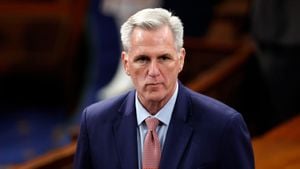The world is treading dangerously close to exceeding its carbon budget, which could have dire consequences for the planet’s climate stability. According to the Global Carbon Budget, new findings indicate global carbon dioxide (CO2) emissions are on track to reach record highs, pushing the world years away from breaching the 1.5 degrees Celsius (1.5C) threshold established by the Paris Agreement. Released on November 13, 2024, the study highlights the urgent need for countries to take drastic measures to curtail emissions stemming from fossil fuel use, which continues to rise.
Regarded as one of the most comprehensive assessments on global emissions, the report draws from extensive international research efforts comprising over 120 scientists. It reveals the grim outlook: if emissions persist at their current rate, there is at least a 50% chance temperatures will exceed 1.5C by the end of the decade. “It’s very likely we will exceed the 1.5C limit if emissions continue at the current rate,” said French climate scientist Philippe Ciais, who contributed to the report. He emphasized the necessity of immediate intervention.
For the year 2024, the emissions projection indicates fossil fuel emissions reaching approximately 37.4 billion tonnes, marking a 0.8% increase from the previous year. This upward trend is concerning, especially when viewed against the backdrop of the World Meteorological Organization's recent announcement of record greenhouse gas levels, which, they warn, commit the world to rising temperatures for decades due to the long-term atmospheric effects of these gases.
While the rate of deforestation-related emissions has decreased over the past two decades, emissions from fossil fuels show no signs of decline. Ciais explained, "Although the rate of increase has slowed since the 2000s, there is still no sign of sustained decline." The current data contradicts the promises made during the COP climate summits by various nations to transition away from fossil fuels.
The findings come amid international discussions on climate finance at COP29, taking place this year in Baku, Azerbaijan. Participants of the summit are under pressure to devise new action plans for 2035, reflecting the urgency felt globally. But amid discussions, actual implementations remain sparse, as many countries have faced challenges meeting their climate commitments.
Fossil fuel usage has not only increased but is projected to continue dominating the energy sector. China and India—the two largest emitters of CO2—have seen significant spikes due to their reliance on coal, oil, and gas for energy needs. For example, coal is projected to rise due to persistent energy demands. Conversely, some nations like the United States and parts of the European Union are experiencing slight decreases, primarily due to reduced coal consumption.
Interestingly, the report details the impact of various sectors on emissions. While aerial emissions from international aviation and shipping are anticipated to rebound sharply post-pandemic, overall fossil fuel reliance poses significant challenges. Reports suggest international shipping alone could see emissions increase by 7.8% from 2023 to 2024.
Although some advancements have been made—like record investments in renewable energy and electric vehicles—the growth of fossil fuel use continues to outstrip these gains. Dr. Pep Canadell, executive director of Global Carbon Project, pointed out the disparity between clean energy investment and growing fossil fuel needs. "Despite progress, the massive investment in renewable energy is still not big enough to meet increasing energy demand," he stated, underscoring the imbalance.
The interaction between natural ecosystems and emissions aggravates the current situation. Forests and oceans serve as significant carbon sinks, absorbing CO2 from the atmosphere. Yet, deforestation, wildfires, and climate-related disruptors threaten these natural systems. Particularly vulnerable regions, such as the Amazon, have exhibited drastic shifts with extensive droughts and subsequent forest fires exacerbated by climate fluctuations.
Looking at the nuances of emissions, 2024 could potentially become the hottest year on record, adding pressure on climate action initiatives. Scientists warn the risks associated with surpassing the 1.5C threshold could include increased extreme weather events and rapid sea-level rise, pointing to dire predictions if carbon emissions do not peak before 2025 and fall significantly by 2030.
Globally, there's concern among climate experts about the underlying economic structures perpetuating fossil fuel dependency. Countries are still heavily reliant on these resources for economic growth, leading to conflicting interests when trying to transition to cleaner energy sources. Despite some countries managing to reduce emissions, like certain EU states, the overall pace of decline is perceived as insufficient.
This year, experts noted the paradoxical nature of climate solutions; increased emissions from fossil fuels maintain enormous pressure on Earth’s systems, creating ripple effects across biodiversity, food security, and human health. Many nations grapple with these consequences daily, emphasizing the importance for communities to prioritize sustainable and equitable energy systems.
The latest research joins others advocating for systemic changes and highlighting the necessity of immediate action to turn the tide against rising greenhouse gases. Scientists warn it is high time for global collaboration directed at comprehensive climate strategies. Heightened public awareness and engagement could mobilize efforts to strengthen international frameworks aimed at reducing fossil fuel consumption.
Each passing year without decisive action inches humanity closer to potential climate catastrophe. Every increment of emissions impacts the atmosphere’s stability, which begs the turning point necessary for deep-rooted solutions to prevent the worst outcomes of climate change.
A changing world demands resilience and innovation to shift paradigms of energy use. If humanity can prioritize collective efforts and allocate resources effectively, perhaps the fight against climate change holds more promise than it may currently appear.
But, as acknowledged by numerous experts, the clock is ticking. Policymakers need to embrace the urgency reflected by scientists and communities alike. The fundamental question remains whether collective action can be galvanized to establish ground-breaking solutions before crossing the perilous climatic boundaries.



